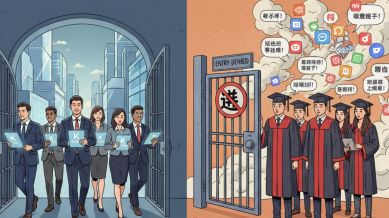‘Favours foreign grads over Chinese students,’: China’s K visa faces criticism
Dubbed as China's H-1B, the new visa faced a backlash in the influential Chinese social media, with netizens questioning its timing, considering the prevailing high unemployment rate

China has yet to implement its widely publicised K visa for foreign professionals, initially scheduled to take effect from October 1. The delay is attributed to the closure of Chinese embassies abroad until October 8 due to National Day and Mid-Autumn Festival holidays. The new visa has sparked criticism on Chinese social media amid concerns over the country’s employment situation amid an economic slowdown.
H-1B Visa Alternatives: Countries Indian students can look forward to
monthly limit of free stories.
with an Express account.
Announced in August, the K visa had gone largely unnoticed until US President Donald Trump introduced a USD 100,000 fee for the H-1B visa. According to spokesperson Guo Jiakun, the K visa aims to promote exchanges and collaboration between Chinese and international young professionals in scientific and technological fields.
Delay in scheduled launch
Despite its planned launch on October 1, the visa has yet to be listed by Chinese embassies, which remain closed for holiday celebrations until October 8. Dubbed as China’s H-1B, the new visa faced a backlash in the influential Chinese social media, with netizens questioning its timing, considering the prevailing high unemployment rate, claims PTI.
Unemployment rates in China
The unemployment rate in China is stated to be around 19 per cent in two years, and the pressure on local jobs is already high, considering 12 million graduates enter the job market every year.
Unfairly favouring foreign graduates
Critics have questioned the value of a STEM bachelor’s degree as a criterion for top talent, with some viewing the policy as unfairly favouring foreign graduates over those who finish their studies in China, the Hong Kong-based South China Morning Post reported. Others have suggested that a lack of employer sponsorship could raise the risk of fraud and trigger an influx of low-quality applicants.
“It is already difficult to thoroughly scrutinise domestic educational credentials, and with the introduction of the K visa, a supply chain of visa agencies will quickly form around it and help foreigners get the visa,” one user posted on the Chinese social media Weibo platform.
“How much manpower and resources will it take to thoroughly vet each application and make sure it is true?” Another commenter asked: “Does this policy imply that our education system is inferior to that of other countries? “Why is it that young people in China with bachelor’s degrees struggle to find good jobs and are forced to pursue master’s degrees, while foreign bachelor’s degree holders are considered ‘tech talent’?” The user called for equal treatment between foreign and home-grown graduates, with a master’s degree as the minimum requirement for K-visa applicants, the Post reported.
According to a report in state-run Xinhua, in comparison to the existing 12 ordinary visa types, K visas will provide added convenience for holders, including more permitted entries, longer validity periods, and extended durations of stay.
After entering China, K visa holders can engage in exchanges in fields such as education, culture, and science and technology, as well as relevant entrepreneurial and business activities. Bar specific age, educational background and work experience requirements, applications for K visas do not require a domestic employer or entity to issue an invitation, and the application process will also be more streamlined, it added.
(with inputs from PTI)